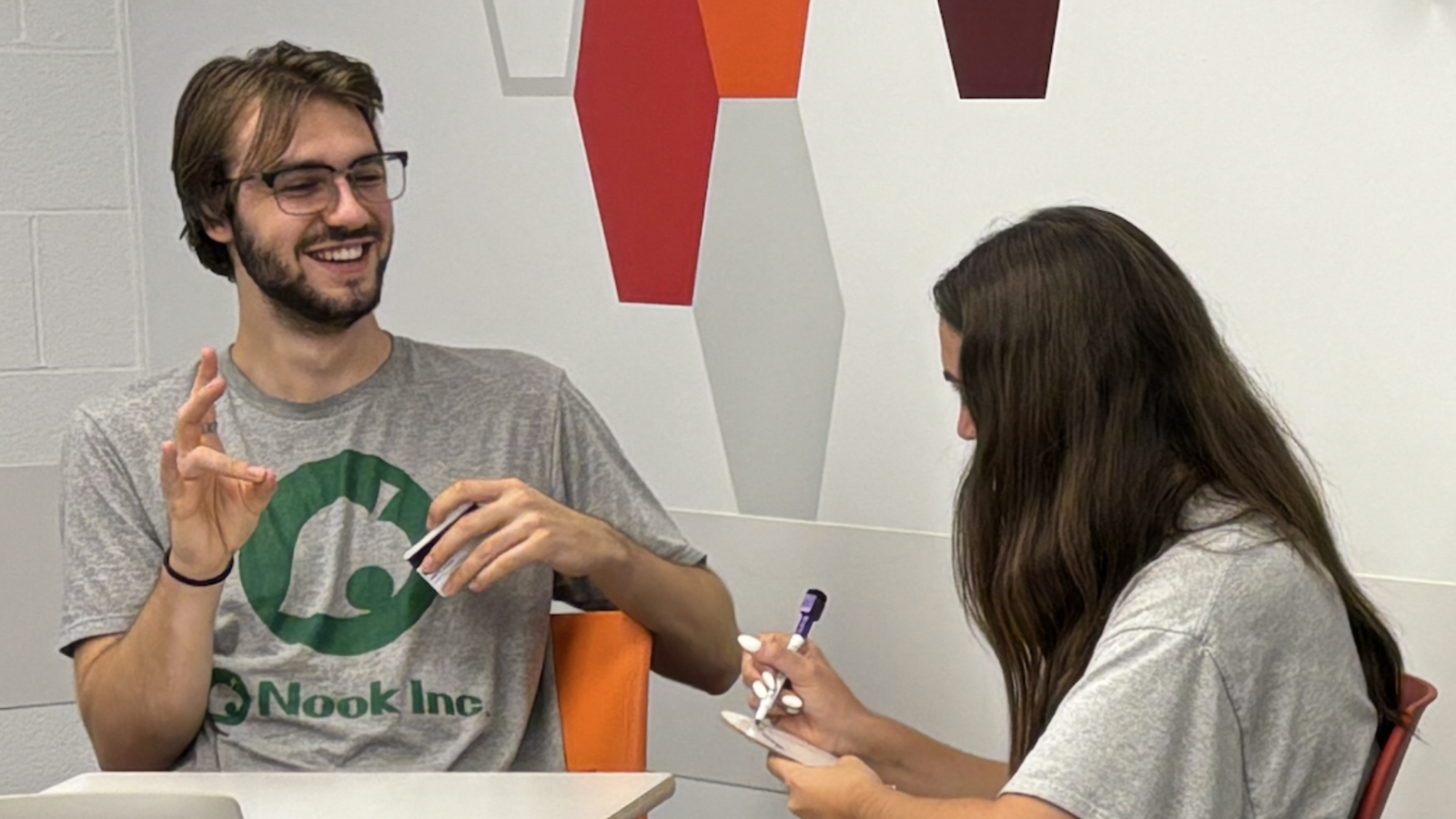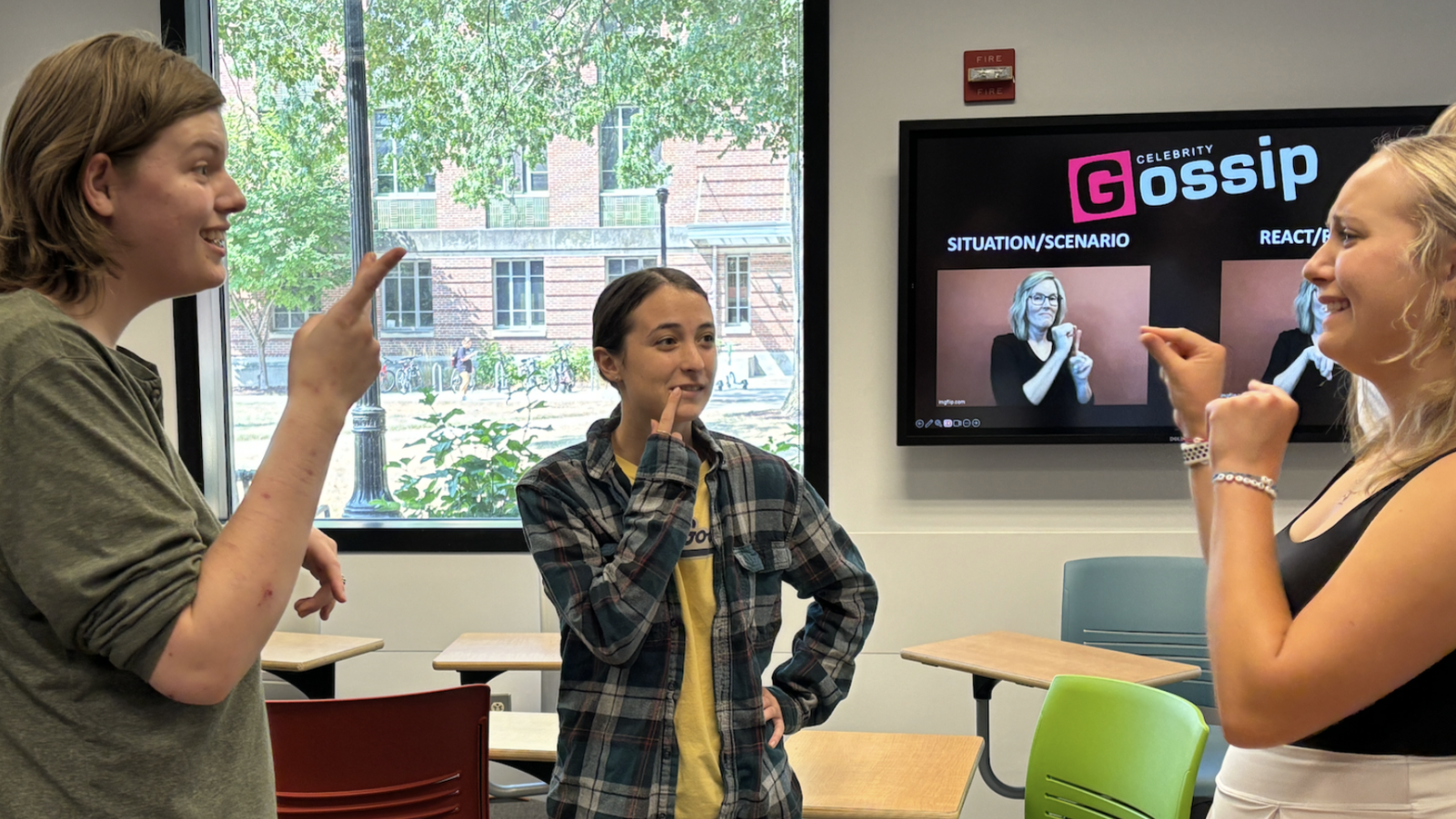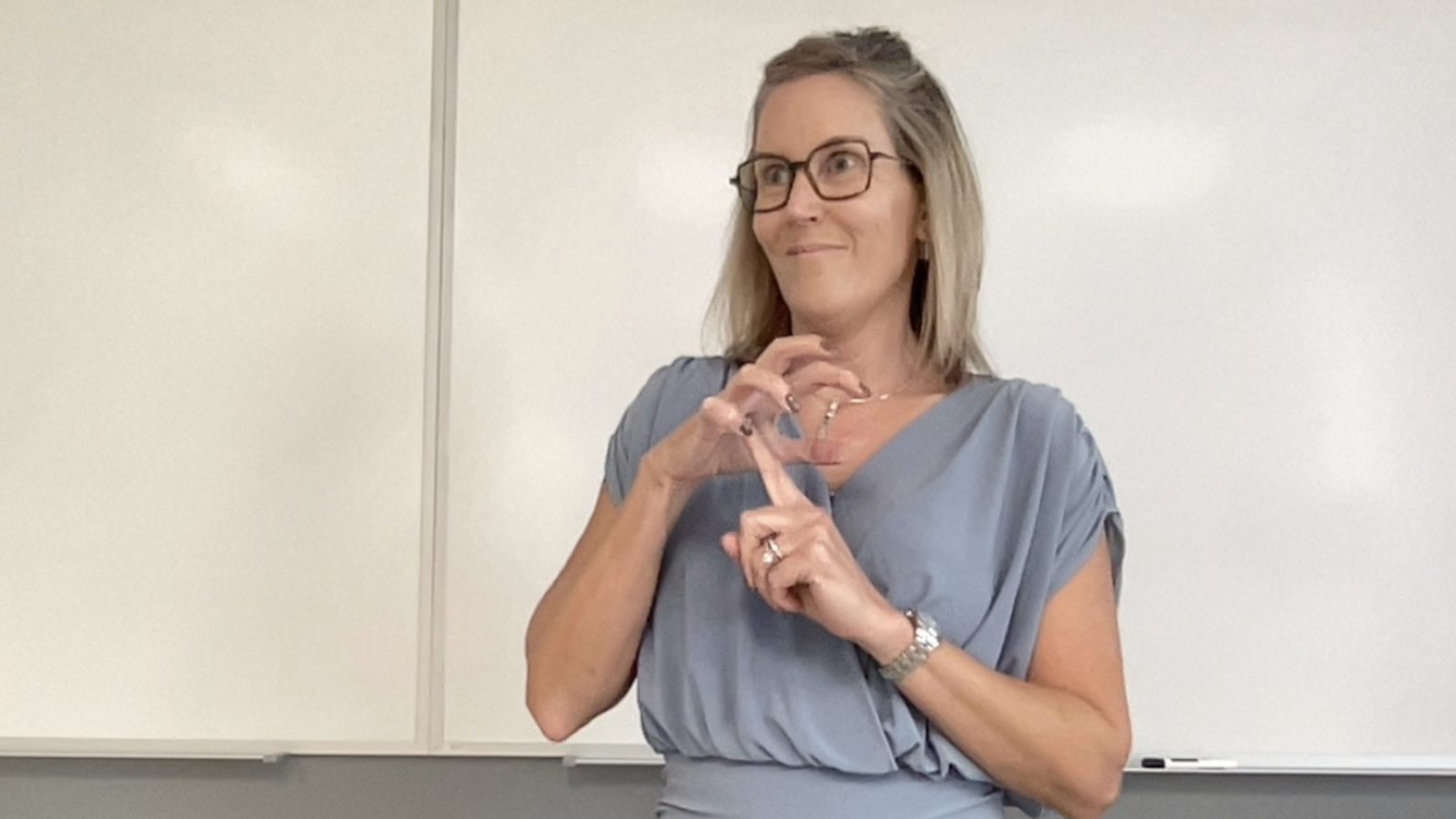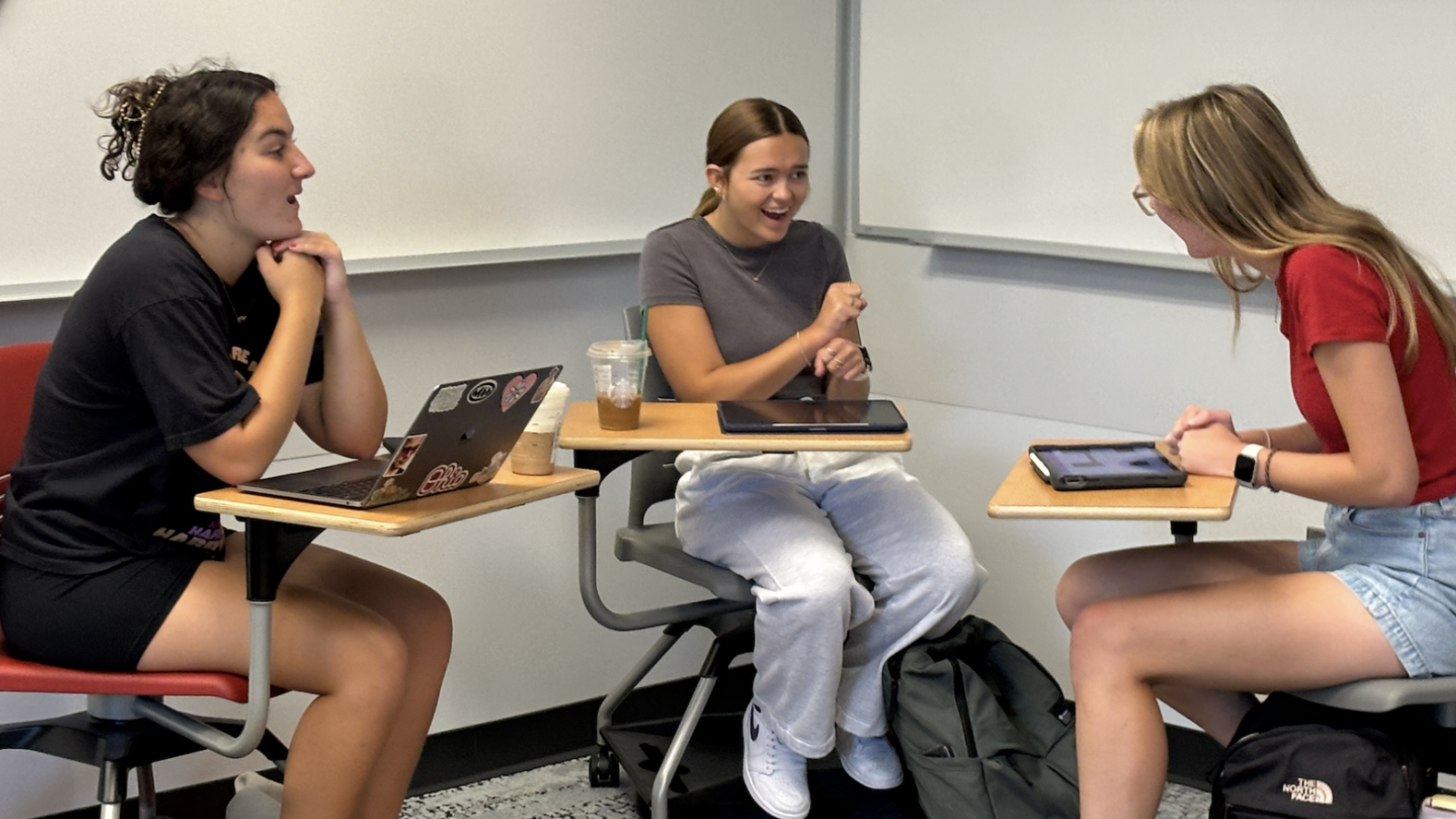Major in American Sign Language (ASL): Applied Communication and Community Studies
As of Spring 2026, the ASL Program offers a major in American Sign Language (ASL): Applied Communication and Community Studies.
Mission and Goals
Students in the ASL: Applied Communication and Community Studies major engage in the formal study of American Sign and the diverse communities of Deaf, DeafBlind, DeafDisabled, Hard of Hearing, CODA (children of deaf adults) and ASL users. Students will develop intermediate level ASL proficiency and develop the knowledge and competencies for professionals to work with and within Deaf communities.
Goal A: Language proficiency. Students will demonstrate proficiency in ASL.
Goal B: Intercultural competence. Students have the attitudes (respect, openness, curiosity), knowledge (of self, culture, sociolinguistic issues) skills (listen, observe, interpret, analyze, evaluate, and relate), and qualities (adaptability, flexibility, empathy and cultural decentering) in order to behave and communicate effectively and appropriately to achieve their goals to some degree in any context.
Goal C: Cultural and historical knowledge. Students will understand the history and culture of deaf communities in the United States and beyond.
Courses
The major is comprised of 30 credit hours. Students may take ASL 3350 prior to completing the ASL language series of 1101, 1102, and 1103. All students will need to have completed ASL 1101-1103 with a grade of C- or higher to take all other required and major core courses.
PREREQUISITES to Major (12 credits)
The following courses have been identified as prerequisites for the ASL: Applied Communication and Community Studies major.
- ASL 1101: Elementary American Sign Language I
- ASL 1102: Elementary American Sign Language II
- ASL 1103: Intermediate American Sign Language I
REQUIRED Courses & Workshop (9 credits and a two-hour workshop)
The following courses have been identified as requirements for the ASL: Applied Communication and Community Studies major.
- ASL 2104: American Sign Language Conversational Discourse I, 3 credit hours.
- ASL 4000-level or above, 3 credit hours.
- ASL 4000-level or above, 3 credit hours.
- World Languages Skills and Competencies, two-hour workshop. (Offered every semester through the Center for Languages Literatures and Cultures.)
Major CORE Courses (21 credits)
The following courses have been identified as core courses for the ASL: Applied Communication and Community Studies major.
* Only one class taught in English (E) permitted.
- ASL 3104: American Sign Language Conversational Discourse II, 3 credit hours.
- ASL 3105: American Sign Language Literature, 3 credit hours.
- ASL 3350: American Deaf Arts and Literature, 3 credit hours. (E)
- ASL 3450: Life Experiences of Deaf Children, 3 credit hours.
- ASL 3650: Deaf Culture and History, 3 credit hours.
- ASL 3750: Deaf Life Experiences, Social Locations, and Social Systems, 3 credit hours.
- ASL 4104: Presentational Language and Discourse Analysis , 3 credit hours.
- ASL 4189S: Intersection of American Sign Language, Deaf Culture, and the Deaf Community, 3 credit hours. (E)
- ASL 4250: ASL Linguistics (synchronous online), 3 credit hours.
- ASL 4350: ASL and Civic Engagement (synchronous online), 3 credit hours.
- ASL 3797 or ASL 5797: Study at a Foreign Institution, 3-9 variable credit hours can count for the major.
- Prerequisite for those who participate in the Study Abroad for Deaf & Signers Program in Siena, Italy:
- Italian 1198.71: Italian on the Ground (asynchronous online) (1 credit)
When exploring opportunities available to graduates in this major, students will find a wide variety of options including business, civil service, community organizing, cultural services administration, finance, health services, hospitality, human resources, journalism, law enforcement, medicine, mission work, the non-profit sector, performing arts, politics (lobbying and legislation), public health, research, and tutoring to name a few.
Graduates are also strong candidates for positions requiring engagement within Deaf communities including at residential schools (administration, human resources, student life, teacher’s aide), advocacy organizations and social service agencies (adult education, counseling, Deaf community services centers, domestic violence survivor advocacy, job coaching, senior services for the Deaf, and support services for deaf people with intellectual and developmental disabilities).
The major provides a foundation for students to apply their knowledge and skills as they pursue graduate or professional study opportunities in such various fields of study as ASL Education, Audiology, Deaf Education, Disability Rights, Early Childhood Education, Interpreting, Law, Linguistics, Medicine, Mental Health Counseling, Nursing, Occupational Therapy, Psychology, Social Work, Speech and Language Pathology, and Vocational Rehabilitation Counseling.
From birth to adulthood, every Deaf person should have full access to language. To access a language from birth means a child can meet expected language milestones, receive language and communication support, and interact with the world without barriers.
Unfortunately, language deprivation is an unjust and devastating reality for many Deaf children. Research shows 70% of Deaf, DeafBlind, DeafDisabled, and Hard of Hearing children do not have access to language. It is an urgent health crisis and poses a significant threat to exercising their civil rights and liberties.
The CDC reports that more than 6% of adults in the United States are Deaf or have serious difficulty hearing, and nearly 61 million (29%) have some type of disability. According to the World Health Organization (WHO) and the United Nations, over 1 billion (more than 15%) of the world's population live with some form of significant disability. Persons with disabilities comprise the world’s largest minority and these figures are increasing through population growth, medical advances and the aging process.
A key part of the university's land-grant mission is represented in the motto "education for citizenship.” This call to action to develop an engaged, informed, and civic-minded citizenry is embodied in the ASL: Applied Communication and Community Studies major. Our graduates will ensure appropriate policies and practices are effectively implemented throughout agencies, organizations, and communities.
It is essential that you make the most of your time at Ohio State. To fulfill your varied academic, personal, and professional interests, we strongly recommend you consider a double major or dual degree at OSU. Today’s students often combine majors and minors with a second (or even third) major or minor because double majors are stronger earners, more innovative, and are great networkers. In fact, diversifying your human capital with a double major can protect your future income.
Students from many different Departments continue their study of American Sign Language beyond the required GE courses. Begin exploring your interests at the The College of Arts and Sciences "Explore Our Programs, Discover Your Path" webpage. If you are interested in examples of how to fast-track a double major, reach out to discuss!
For more information, contact Kristin Wickham-Saxon, Director of Undergraduate Studies.




